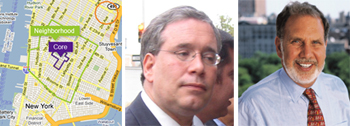 From left: a map of the NYU proposal, Manhattan Borough President Scott Stringer, and NYU President John Sexton (click image for larger version of the map)
From left: a map of the NYU proposal, Manhattan Borough President Scott Stringer, and NYU President John Sexton (click image for larger version of the map)After last night’s open house unveiling of New York University’s 2031 expansion plan, critics are still reeling.
The school’s latest plans, which include building two so-called “superblocks” in the Washington Square Park neighborhood and possibly establishing a remote academic center on Governors Island, drew a glut of opposition from groups including the Greenwich Village Society for Historic Preservation, the East Village Community Coalition and the Washington Square Village Tenants Association, which all attended the open house.
Prior to the event yesterday, the sixth of its kind that the school has hosted, Andrew Berman, executive director for the Greenwich Village Society for Historic Preservation, held a press conference to speak out against NYU’s plans.
But he’s not stopping there.
Berman said that organizations like his plan to continue protesting.
“Most of what NYU [wants to build] would require some very serious public approval,” he said.
Marty Tessler of the Greenwich Village Block Associations and a member of a community task force formed to address the expansion, said that his group plans to look into the “zoning regulations in the area slated for the superblock.”
During last night’s open house, the school outlined its expansion plans. They call for the construction of 3 million square feet of classrooms, offices and student housing in the Washington Square Park area, and satellite campuses in Downtown Brooklyn and on Governors Island. While the school maintains that the Washington Square Park growth is of primary importance, many community groups are galled over the sheer amount of space that NYU seeks to construct in the area.
Manhattan Borough President Scott Stringer, who is on the task force, said there are some aspects of the expansion plans that still concern him.
“I support the Governors Island proposal [but] I’m concerned about what’s going on with the ‘superblock’ [plan],” Stringer said. “It’s very big.”
Berman said he believes that NYU has not done a good job of integrating recommendations from the community.
“The results still don’t really reflect — in many important ways — the feedback [the NYU administration has] gotten from the community,” Berman said, noting that the school has failed to broach other development options, like taking over stalled development sites.
“Three million square feet is much too much,” he added.
But John Beckman, an NYU spokesperson, said the school has gone to great lengths to incorporate community input into its plans.
“The framework we’ve presented… is a reflection of the feedback from the community,” Beckman said. He noted that while the school has included the possible development of satellite campuses in its plans, building in the Washington Square Park area is a necessity, because students need to have classrooms in close proximity to each other.
Berman, however, disagrees, noting that the school is made up of several self-contained academic entities, which would make satellite campuses feasible.
“NYU is [comprised of] 14 different schools. It’s in a unique position to create satellite campuses,” Berman said.
But while the Governors Island satellite campus plan has emerged as one of NYU’s most popular proposals, Mayor Michael Bloomberg’s April 11 announcement that the “city will have primary responsibility to develop and operate the island,” casts some doubt on its feasibility.
“There’s an outside chance, at best,” Berman said.
Beckman said NYU feels good about its communication with the community.
“As we have understood our planning… we’ve been sharing [the plans] with people in real time,” Beckman said.
In addition to the open houses, NYU has participated in over 50 meetings with the task force over the last nearly four years to discuss the plans, Beckman said. The task force, which also includes City Council Speaker Christine Quinn and community advocacy groups, was integral in shaping NYU’s plans, he said.
“The reason that we’re engaged in this kind of discourse… has been to get their opinions,” Beckman said. “We don’t have all the wisdom in Greenwich Village.”